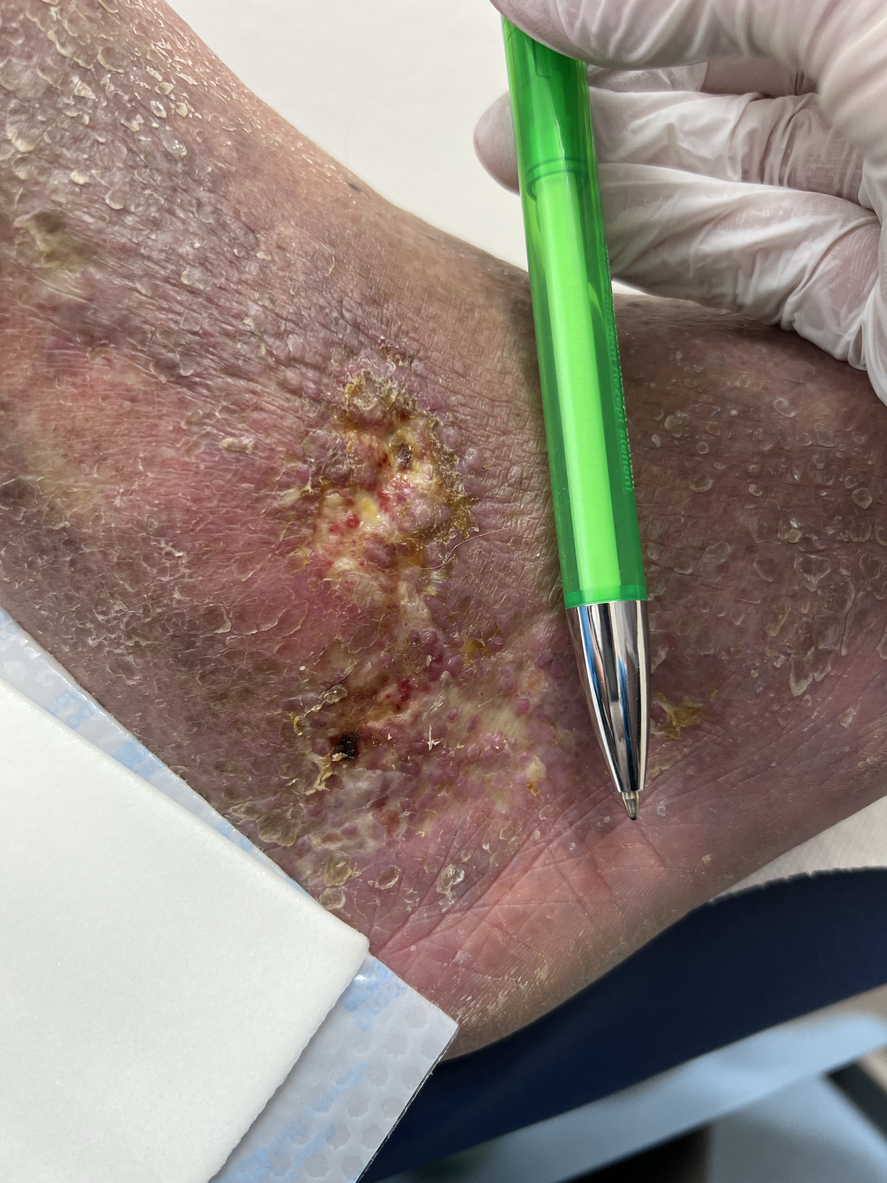Blood circulation is crucial for delivering nutrients and oxygen throughout the body. Poor circulation in the legs and feet not only affects these areas but can be an indicator of broader health issues.
What’s Causing My Poor Blood Circulation In My Legs and Feet?
Several factors can cause poor blood circulation in the legs and feet, such as narrowed arteries, blood clots, or weakened veins, which impede efficient blood flow. Understanding these mechanisms is critical to addressing circulation problems effectively.
Other causes include but aren’t limited to:
Age-Related Factors
Elderly individuals often experience blood circulation issues due to reduced physical activity, aortic thickening, and decreased baroreceptor sensitivity.
Atherosclerosis
Atherosclerosis, a condition marked by artery hardening, is a leading cause of circulation problems, potentially leading to Peripheral Artery Disease (PAD) if left untreated.
Environmental and Genetic Factors
Cold environments can constrict blood vessels, worsening circulation issues. Genetics also plays a role, as some people are predisposed to circulatory problems.
Deep Vein Thrombosis (DVT)
Deep Vein Thrombosis (DVT), a type of blood clot in deep veins, typically in the lower leg or thigh, can lead to serious complications like pulmonary embolism if the clot travels to the lungs.
Diabetes
Diabetes can cause a range of health issues, including poor blood circulation, kidney disease, and increased risk of heart disease and stroke.
Inactive Lifestyle
A sedentary lifestyle negatively impacts muscle strength, bone health, immune system, and blood circulation. Lifestyles involving prolonged sitting or standing can adversely affect circulation. Incorporating short, frequent walks and avoiding crossing legs while sitting can help.
Obesity
Obesity not only leads to bone and joint issues, sleep apnea, and cardiovascular problems but also can impair blood circulation.
Peripheral Artery Disease (PAD)
Peripheral Artery Disease (PAD), a consequence of atherosclerosis, involves plaque buildup in arteries, leading to reduced or blocked blood flow.
Smoking
Smoking significantly harms blood vessels, contributing to poor blood circulation and increasing the risk of various health issues.
Chronic Venous Insufficiency
Chronic Venous Insufficiency, where blood pools in veins instead of returning to the heart, can result from genetic factors, age, pregnancy, obesity, or a sedentary lifestyle.

What Are The Symptoms of Poor Blood Circulation?
- Swollen veins and arteries (varicose or "spider" veins)
- Heaviness in legs and feet
- Skin discoloration
- Swollen legs and feet
- Split, weeping skin
- Ulcers
- Pelvic pain or discomfort
- Restless legs and feet
- Numbness and tingling
- Aches or leg pain
- Lack of hair growth on legs and feet
- Toenails grow very slowly or stop growing
Seek medical treatment if you’re experiencing sudden leg pain, swelling in one leg, chest pain, dizziness, or pain radiating warmth from the calf to the knee, as this may be a medical emergency called a deep vein thrombosis or DVT.
Think you may have symptoms of Poor Blood Circulation?
What Happens If I Don’t Get Treatment For My Poor Circulation?
Poor circulation won’t improve on its own and can cause more problems with your health. Minor injuries can take much longer to heal if you have poor blood circulation in your legs and feet. This means that a small bruise can eventually become an ulcer, and ulcers can potentially become infected. Talk to your doctor about managing any underlying conditions causing poor circulation, such as high blood pressure, PAD, or diabetes.
What Is the Treatment For Poor Circulation In The Legs?
Your first step in treating poor blood circulation is a visit to your vascular specialist. They may recommend an exercise and diet program and medication, but some patients see the most benefit from a vascular treatment such as angioplasty or bypass surgery.
Your vascular specialist will take a comprehensive medical history, examine your lower extremities, and may order venous doppler imaging to get a better view of your vascular system and confirm your diagnostics. Once you are diagnosed, your vascular specialist will help you make a comprehensive treatment plan. Treatment includes but isn’t limited to:
Lifestyle Changes for Better Circulation
Regular exercise, leg elevation, wearing compression garments, quitting smoking, and maintaining a healthy weight are essential steps. Regular, low-impact exercise, maintaining a healthy weight, quitting smoking, and managing your blood pressure, blood sugar, and cholesterol can help you avoid further complications caused by poor blood circulation. Incorporating heart-healthy foods like cinnamon, dark chocolate, nitrate-rich foods, dark berries, and healthy fats can improve circulatory health.
Vascular Treatments
For some, procedures like angioplasty or bypass surgery may be necessary. These treatments aim to improve blood flow and alleviate symptoms.
Getting Regular Medical Care
Post-treatment care includes regular consultations, ultrasound scans, and adherence to a treatment plan tailored to individual needs. Regular check-ups can detect circulatory issues early. Blood pressure and cholesterol levels are key indicators to monitor.
Stay Hydrated
Staying hydrated is vital for healthy circulation. A diet rich in omega-3 fatty acids, like those found in fish, nuts, and seeds, can also improve vascular health.
Manage Your Stress
Chronic stress can constrict blood vessels, impacting circulation. Meditation, yoga, or even simple breathing exercises can help manage stress levels.
Managing poor circulation in the legs requires a holistic approach guided by a vascular specialist. From initial diagnosis through advanced imaging techniques to crafting a personalized treatment plan, every step is vital. Key elements include embracing lifestyle changes like regular exercise, dietary adjustments, stress management, and potential medical interventions such as angioplasty or bypass surgery. Regular medical check-ups and monitoring of key health indicators are essential for ongoing control and prevention of complications. Remember, improving circulation is about treating symptoms and adopting a comprehensive lifestyle and healthcare regimen for long-term vascular health and well-being.

Who Do I See For Poor Blood Circulation In The Legs?
If you’re experiencing poor circulation in your legs, you may need to see a vascular specialist. Vascular specialists focus on your vascular health, including arteries, veins, and lymphatic vessels. They have the training and expertise to diagnose and treat conditions affecting blood circulation more effectively than a general practitioner.
It's essential to consult a vascular doctor for accurate diagnosis and treatment, especially when symptoms like leg or pelvic pain are present. Leg pain, swelling, numbness, or discoloration are often the symptoms of other underlying medical concerns.
Vascular specialists use advanced diagnostic tools and techniques to accurately identify the specific vascular condition causing these symptoms.
At Center for Vascular Medicine, our vascular specialists can provide a comprehensive treatment plan tailored to the patient's disease and needs.

Why Should I See a Vein Specialist?
If lifestyle changes and primary care consultations don't improve symptoms, it's important to seek advice from a vascular specialist, as they can offer more specialized treatments and advice.
Each individual's situation is unique. Vascular specialists provide personalized care plans based on a comprehensive evaluation of the patient's specific needs and medical history.
These specialists use state-of-the-art diagnostic tools like Doppler ultrasounds, CT angiography, and MRIs to assess blood flow and blood vessels' health, allowing for a more precise diagnosis than what might be available in a general practitioner's office.
Vascular specialists offer a range of treatment options that go beyond medications and lifestyle changes. They are skilled in performing minimally invasive procedures, such as angioplasty or stenting, as well as more complex surgeries like bypasses or vascular grafting. Their ability to provide a broader range of treatments ensures a more tailored approach to each patient's needs.
Vascular health is a lifelong commitment. The vascular specialists at Center for Vascular Medicine treat existing conditions and focus on preventative measures to avoid future vascular issues. We work with patients to develop long-term management plans, including lifestyle modifications, regular screenings, and ongoing medical support.
Patients with severe or complicated vascular conditions, such as deep vein thrombosis or peripheral artery disease, often require the specialized skills of a vascular surgeon. These experts are equipped to handle complex cases that require detailed attention and advanced medical interventions.
Maintaining good circulation in the legs and feet is essential for overall health and well-being.
A combination of lifestyle changes, regular medical consultations, and personalized care plans are key to managing and improving blood circulation effectively.
Ready to speak with a vascular specialist?
Take the First Step Towards Improved Vascular Health with Center For Vascular Medicine
In the United States, cardiovascular disease claims a million lives annually, and shockingly, half of these deaths result from vascular diseases not directly involving the heart. We are dedicated to combating this silent epidemic at Center For Vascular Medicine. Specializing in diagnosing and treating deep venous and arterial diseases of the pelvis and lower extremities, we bring advanced medical expertise directly to the forefront of patient care.
Your health journey is our priority. We understand the complexities of vascular conditions and offer personalized, compassionate care that treats you like family. Our specialists employ the latest diagnostic techniques and innovative treatments, ensuring you receive the best care for your needs.
Don’t let vascular disease diminish the quality of your life. At Center For Vascular Medicine, we are committed to helping you regain your health so you can enjoy precious moments with your loved ones. Schedule a consultation today and take a crucial step towards a healthier, happier you. Your journey to improved vascular health begins with us - let's walk this path together.
We serve patients from Annapolis, MD, Columbia, MD, Easton, MD, Glen Burnie, MD, Greenbelt, MD, Prince Frederick, MD, Silver Spring, MD, Waldorf, MD, Fairfax, VA, Fredericksburg, VA, New Brunswick, NJ, and Union, NJ.
Resources



